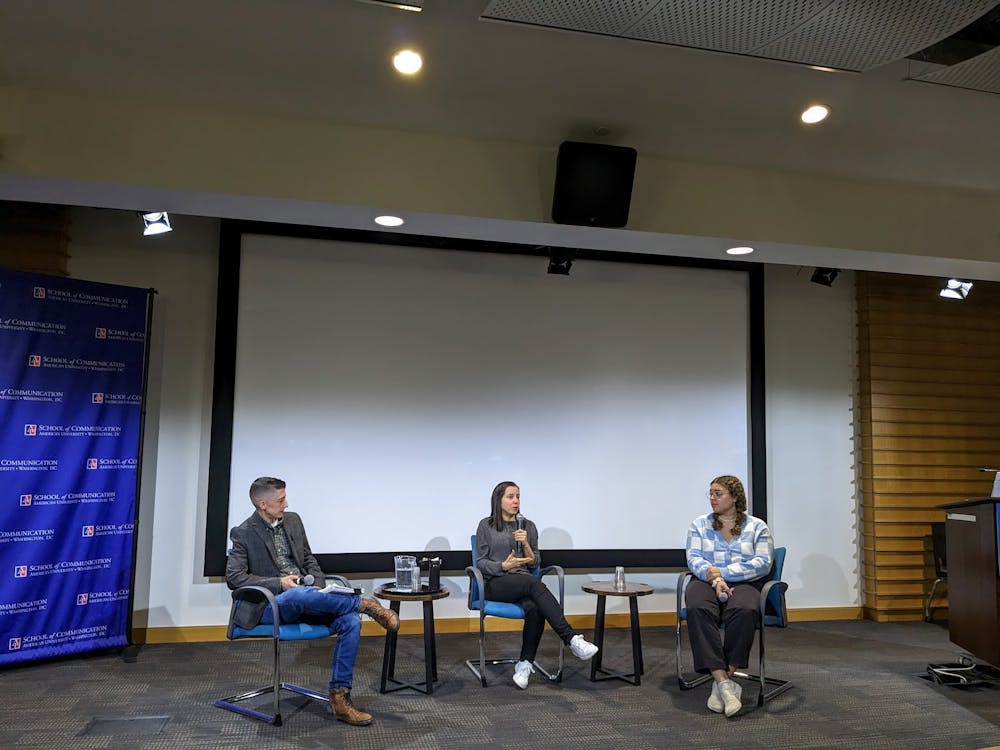Two American University professors and the president of AU Pride discussed inclusivity and transgender-inclusive policies at a discussion of transgender life in higher education hosted by the School of Communication on March 7.
The event, part of SOC’s Inclusive Excellence Week, began with an introduction by Tia Milledge, the SOC director of communication and outreach.
Perry Zurn, an associate professor in the College of Arts and Sciences, spoke about the importance of talking about the trans experience, something that is not often discussed.
“Honestly, we don’t talk about trans issues a lot at AU, whether that’s in classrooms or in public events or even in queer spaces,” Zurn told The Eagle. “There’s just not a whole lot of conversation about it. So I’m hoping that people come into that room and have an experience they rarely could have on AU’s campus. … Let’s grapple with the state of trans life here at the University.”
Zurn said this conversation is especially important in light of the influx of anti-trans legislation being passed in the U.S.
Nearly 1.7 percent of U.S. undergraduate and graduate students reported their gender as transgender, nonbinary or questioning, according to a study by the Association of American Universities. However, there is limited data about LGBTQ+ students in higher education.
Cheyenne Smith, the president of AU Pride, said one of the biggest challenges facing the trans community at AU is a lack of information. They described certain “roadblocks” in the educational setting.
“The fact is, we live in a transphobic system inherently, and so we’re going to have inherent biases,” Smith said at the event, adding that they hope for a future in which trans and nonbinary students no longer have to explain themselves.
Juliana Martínez, an associate professor in CAS, said another related challenge stems from cisgender normativity, the assumption that everyone is, or ought to be, cisgender. She also said there is a lack of representation of trans people in higher education leadership.
“The higher you go up the food chain, the more and more cis it gets, the less diversity of any kind you find,” Martínez said at the event. “Nowadays, particularly, it’s very rare to find any high-up administrators that are not cis. You’ll find increasingly more people that are openly gay, bisexual, lesbian, pansexual, but they’re still pretty cis and that keeps the system going, creating blind spots.”
She added that higher education leaders can remedy this problem by hiring more trans or nonbinary faculty members.
Martínez said the inclusion of trans people should not only apply to those who align with cisgender norms.
“We need to also be mindful that sometimes the model of inclusion can look a lot like assimilation, and that has a lot of problems,” Martínez said at the event. “Because it’s like, ‘as long as you’re the good kind of … Latina, the good kind of Black person, the good kind of trans person,’ and the ‘good kind’ really means that you follow the norms and expectations that the majority have.”
She added that inclusion needs to go beyond using someone’s correct pronouns. Zurn said there is a distinction between policy-driven inclusion — provisions such as name changes or restroom access for trans students — and trans poetics. Trans poetics describes the “art and labor of transgender poets,” according to Transgender Studies Quarterly.
“You’re the sort of person who needs this sort of thing and sort of pass all [these policies] so you can function well,” Zurn said about the way systems in power allay the trans community. “That kind of policy-driven inclusion doesn’t get to supporting the community.”
Zurn said AU should make more of an effort to connect with local LGBTQ+ groups, as community-building is integral to the trans experience.
“I think it will be much better too if the University had stronger ties to the D.C. queer and trans organizations,” Zurn told The Eagle. “It’s common for trans people to feel super isolated and often not know each other and not know our histories and not know why it matters. And kind of helping to plug us into or connect us to local queer and trans communities, it would be a huge benefit.”
This story was edited by Mackenzie Konjoyan, Jordan Young and Nina Heller. Copy editing done by Isabelle Kravis, Leta Lattin, Luna Jinks, Sarah Clayton and Stella Guzik.





